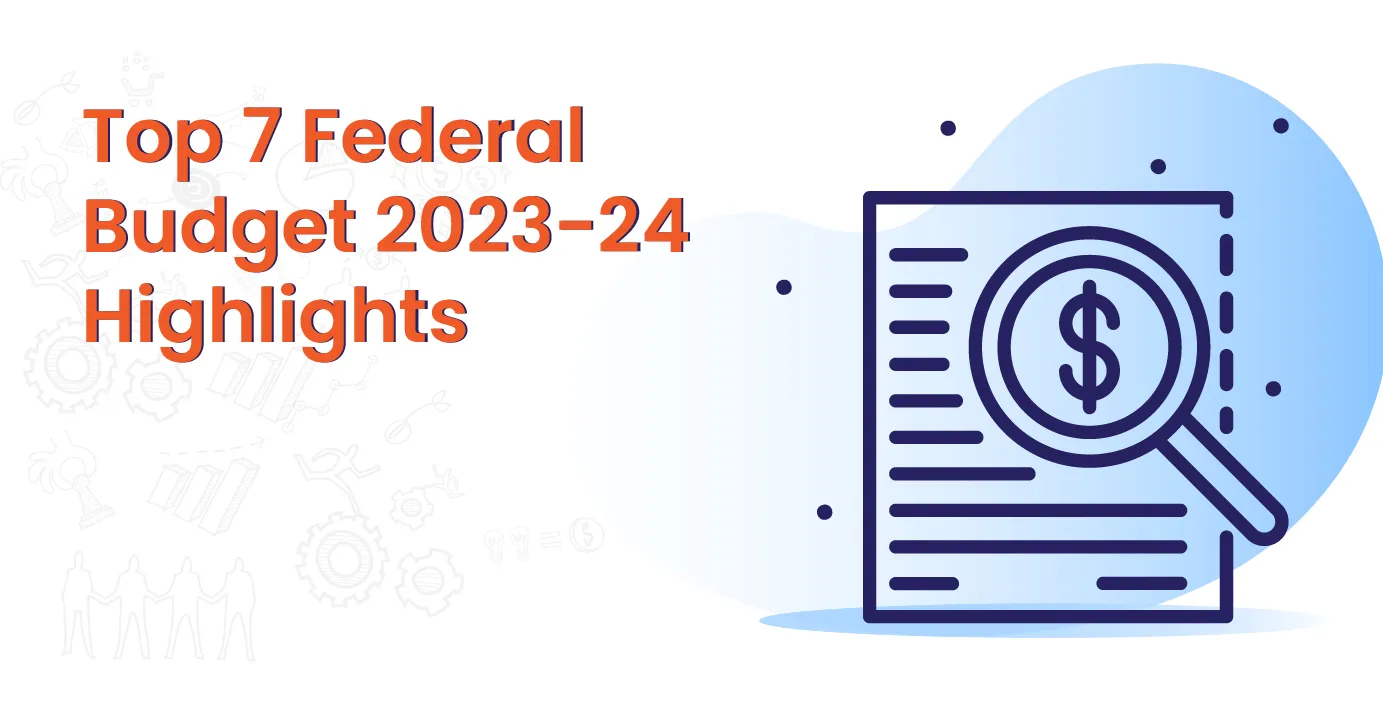
It’s that time of the year, mates!
Australia’s Federal Budget 2023-24 is here and it’s making a tidal wave of opportunities in their latest fiscal masterpiece.
From economic upgrades that’ll have you zooming down finances like a Formula One, to instant assets write-off that’ll have your inner businessman squealing with excitement, this budget is all about building a brighter and bolder future.
In a bid to provide relief and foster a stronger care economy, the government has unveiled a range of measures that target both individuals and businesses.
And, let’s not forget the sweet taste of tax relief! The government is waving its magic wand, sprinkling tax cuts like fairy dust.
In this blog post, we’ll delve into the intricacies of Australia’s Federal Budget 2023-24 and unravel the exciting surprises it holds for you.
Federal Budget 2023-24: Overview
Treasurer Jim Chalmers revealed the Federal Budget 2023-24 on May 9, 2023. It’s designed to tackle tough challenges like rising interest rates, inflation, and the increasing cost of living.
As we gaze into the future, the future seems promising. The projected decrease in interest expenses is poised to enhance the long-term framework of the budget in the upcoming decade, paving the way for substantial savings.
Why it matters?
- This budget is a well-thought-out and balanced response to the challenge of supporting individuals during a time of high inflation and government debt.
- There are no changes to the previously proposed income tax cuts, which are still expected to take effect on July 1, 2024, as planned. These cuts will reduce the tax burden for taxpayers, providing them with some benefits.
Top 7 Federal Budget 2023-24 Highlights
The Australian economy has generated an impressive additional revenue of approximately $134.8 billion in 2022-23 and the subsequent four years. This boost in revenue can be attributed to a significant rise in both company and personal income taxes.
Here are the top 7 highlights of the Federal Budget 2023-24.
- Starting from July 1, 2023, until June 30, 2024, small businesses with a yearly income of less than $10 million can deduct the full cost of eligible assets worth less than $20,000. That means if you buy or start using assets within this period, you can instantly write them off.
- The government has allocated funding to the Australian Taxation Office (ATO) over a four-year period, starting from July 1, 2023. The initiatives have one primary goal: ensuring businesses fulfill their tax responsibilities. This includes accurate accounting and timely remittance of GST, as well as correct claiming of GST refunds.
- The government plans to make changes to the tax law that will benefit small businesses and individuals who pay taxes through the PAYG and GST installment systems. Specifically, the GDP adjustment factor for these installments will be reduced from 12% to 6% for the 2023-24 income year. This reduction in the factor means that small businesses and eligible individuals will receive more cash flow support.
- The budget for the upcoming year did not announce any changes to personal income tax rates. So, the rates may remain the same as before. However, starting from July 1, 2024, there will be some changes. The 32.5% tax rate will be reduced to 30% for a large income bracket between $45,000 and $200,000. This adjustment will bring the middle tax bracket closer to the corporate tax rates.
- The government has allocated additional funding over two years to extend the Personal Income Tax Compliance Program. This extension will allow the ATO to continue its efforts to ensure tax compliance by individuals. They will use a combination of proactive measures, preventive actions, and corrective activities to address areas of non-compliance.
- Starting July 1, 2026, employers will need to pay superannuation on payday instead of quarterly, allowing businesses and superannuation funds a three-year timeframe to get ready.
- The government is offering a 20% bonus deduction for expenses that help with electrification and energy efficiency. If your turnover is under $50 million, you’re eligible. You can get up to $20,000 per year; this only applies to assets used or installed between July 1, 2023, and June 30, 2024.
Wrapping Up
As Australia navigates the complexities of its economic landscape, the Federal Budget 2023-24 represents a concerted effort to strike a balance between relieving the pressures faced by individuals and ensuring a transparent business environment.
With its sights set on building a sustainable economy, the government is taking steps to address the concerns of its citizens while leveling the field for businesses to grow.
Want to Know More About the Federal Budget 2023-24? Talk to Our Experts!
If you’re looking to navigate the complexities of taxes with ease, we’re here to assist you every step of the way with our personalized guidance and comprehensive range of services. Just drop us a line at info@nanakaccountants.com.au, and we’ll take it from there.
The information on this website is for general informational purposes only and should not be considered financial, taxation, or legal advice. While we strive for accuracy, Nanak Accountants does not guarantee the completeness or reliability of the content. Laws and regulations change over time, and we recommend consulting a qualified professional before making any financial or business decisions. Nanak Accountants is not liable for any loss or consequences arising from reliance on this information. For personalised advice, please contact Nanak Accountants directly.